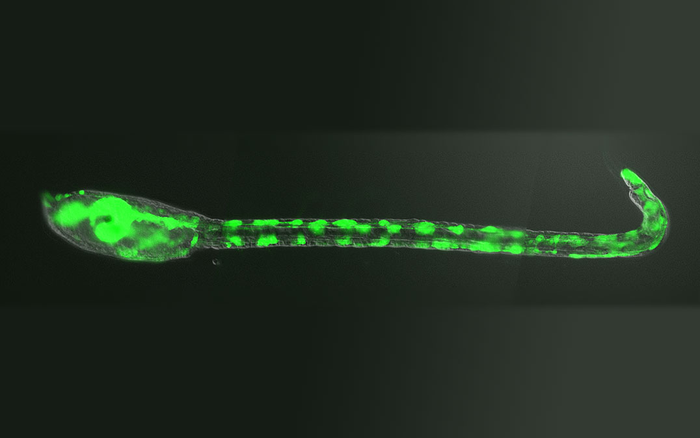Tsukuba, Japan – When baking a cake, even a small change to your recipe can have a major impact on the final product. Recently, researchers in Japan have demonstrated that a small alteration in the gene expression “recipe” of the model organism Ciona intestinalis leads to a significant change in the development of sensory cells.

Credit: University of Tsukuba
Tsukuba, Japan – When baking a cake, even a small change to your recipe can have a major impact on the final product. Recently, researchers in Japan have demonstrated that a small alteration in the gene expression “recipe” of the model organism Ciona intestinalis leads to a significant change in the development of sensory cells.
In a new study published in PNAS, a research group led by the University of Tsukuba investigated the role of homeobox gene POU IV in the development of neural sensory cells in the protovertebrate Ciona intestinalis, a type of sea squirt that develops from a tadpole-like larva. Ciona is useful as a model system to examine changes in gene expression during development and to evaluate how gene networks affect the development of different cell types.
During development, multiple types of sensory neurons arise in Ciona, including palp sensory cells (PSCs) and bipolar tail neurons (BTNs). The specification of these cell types is thought to be regulated by POU IV, which has a similar counterpart in vertebrates called BRN3. The research team at the University of Tsukuba sought to understand the role of POU IV in the development of sensory cell types in Ciona by manipulating POU IV expression during development and evaluating the resultant changes in gene expression at the single-cell level.
“Single-cell transcriptomic analysis allowed us to look at individual cells produced within the organisms and analyze how their gene expression profiles were altered as a result of changes in POU IV expression,” explains main author Professor Takeo Horie.
The research team found that alteration of POU IV expression led to the expanded expression of sensory cells, including novel hybrid cell types that shared characteristics of both PSCs and BTNs, as well as cells that expressed a unique battery of genes that has not been observed previously in Ciona, which the researchers termed a ‘synthetic gene battery’.
“To better understand the processes underlying our observations, we explored the expression of Foxg and Neurogenin, two upstream regulators of POU IV,” says Professor Horie.
The research team’s findings indicated that misexpression of POU IV leads to the activation of Foxg and Neurogenin, which may underlie the development of the hybrid sensory cells and the expression of the synthetic gene battery. This study sheds light on the potential effects of gene manipulation during development and highlights the need for precise strategies to eliminate the induction of unwanted cell types during cellular reprogramming.
###
The article, “Neuronal identities derived by misexpression of the POU IV sensory determinant in a protovertebrate,” was published in PNAS at DOI: https://doi.org/10.1073/pnas.2118817119.
This study was supported by a grant from the NIH (to M.L.) (NS076542) and by Grants-in-Aid for Scientific Research from the Japan Society for the Promotion of Science to T.H. (19H03204, 21K19249, 21H05239), T.G.K. (19H03213), and R.H. (20J00278, 21K15099). T.H. is supported by the Toray Science Foundation and Japan Science and Technology Agency FOREST Program (Grant JPMJFR2054). R.H. is supported by the Kao Foundation for Arts and Sciences. T.G.K. is supported by a research grant from the Hirao Taro Foundation of KONAN GAKUEN for Academic Research. This study was further supported by the National BioResource Project of the Ministry of Education, Culture, Sports, Science and Technology, Japan. P.P.C. is supported by a National Human Genome Research Institute T32 Training Grant
DOI
https://doi.org/10.1073/pnas.2118817119
Article Title
Neuronal identities derived by misexpression of the POU IV sensory determinant in a protovertebrate




